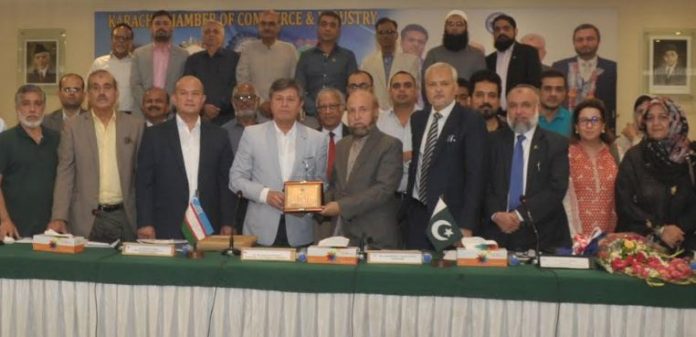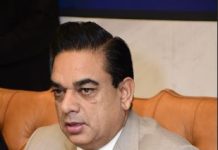KARACHI, AUG 18 /DNA/ – Ambassador of the Republic of Uzbekistan Oybek Arif Usmanov has informed that trade between Uzbekistan and Pakistan has constantly grown at a pace of 50 to 55 percent annually during the last three years by starting from US$50 million to US$240 million last year whereas, this year, bilateral trade volume has already touched US$180 million so far.
“The good thing is that Uzbekistan-Pakistan trade remains balanced which means we both are contributing & compensating, not competing with each other. The Transit Trade Agreement signed in 2021 and Preferential Trade Agreement inked in 2022 surely facilitated growth while it was encouraging to see that during the last joint ministerial commission meeting, Finance Ministers of both countries also signed US$1 billion trade roadmap agreement. We, hence, expect trade volume to reach US$400 million by the end of this year and hopefully, it would reach US$1 billion in the next two years”, he added while speaking at a meeting during his visit to the Karachi Chamber of Commerce & Industry (KCCI).
President KCCI Mohammed Tariq Yousuf, Chairman Diplomatic Missions & Embassies Liaison Subcommittee Zia ul Arfeen, Trade Counselor Uzbekistan Embassy Bakhrom Yusupov and KCCI Managing Committee Members were also present on the occasion.
Uzbek Envoy said that after going through the most difficult times, Uzbekistan has now become a country whose economy, industries and the agriculture sector have been emerging due to liberalization of economy, business-friendly policies and facilitation of banking & finance. “Uzbekistan has not just become an emergent economy of Central & South Asia but also an emerging economy in the global arena due to solid industrial and agricultural growth along with technology and innovation.”
He mentioned that Karachi was always dear to the hearts and minds of Uzbek people which can be gauged from the fact that after Uzbekistan’s independence, the first flight arrived in Karachi and to date, regular flights by Uzbek Airways and PIA have been flying between Tashkent and Karachi. “In a very difficult situation in Uzbekistan’s history, the business community of Karachi kept visiting our country and maintained good relations with Uzbek business community. Uzbek brothers and sisters also regularly visit Karachi to buy various commodities which are brought to Uzbekistan via Uzbek Airways”, he said, adding that the first Consulate General of Uzbekistan was also opened in Karachi where he himself served in between 1998 to 2001 to strengthen the diplomatic relations.
He also underscored the need for having maximum exchanges of trade delegations and Business-to-Business meetings to build mutual trust and strong mechanism of cooperation. “Uzbek Government is always ready to adopt any model or mechanism which facilitates traders, industrialists and transport companies of both countries”, he added.
Uzbek Envoy said that there was a need to focus on trade expansion and diversification, besides effectively dealing with numerous hurdles hindering trade growth between the two countries. “Pakistan, Afghanistan and Uzbekistan are likely to meet at the ministerial level very soon in October 2023 to agree upon a Trilateral Trade Agreement”, he informed and hoped that Pakistan’s initiative of holding this trilateral meeting, which has also been agreed by Afghanistan and Uzbekistan, takes place with agendas of transit trade, transport facilitation and devising strategies to avoid unnecessary Customs tariffs and duties for traders and transporters of all three countries.
He also invited KCCI to send trade delegation to Uzbekistan to find good businesses in Uzbek provinces where many Pakistani companies were already doing business in pharmaceutical, textiles and other sectors. “I am here to facilitate you and tell you about the readiness of Uzbek Government for meeting the business community of Karachi”, he said, adding that November or December is the best time to send delegations to Uzbekistan.
President KCCI Mohammed Tariq Yousuf, while underscoring the need to explore new avenues between the two countries for trade and investment growth, stated that the existing trade volume between Pakistan and Uzbekistan stands at a very low level of just US$240 million which was mainly due to lack of banking channel between the two countries. “To expand trade and investment ties, the Uzbek business community has to be connected with KCCI which holds of a host of businesses from almost all sectors of the economy”, he stressed.
He noted that although trade ties between Pakistan and Uzbekistan were based on mutual trust which was really good but there was a dire need to have proper banking channel between the two countries which, if provided, would certainly result in substantially improving the existing trade volume. “We (KCCI & Uzbekistan Embassy) must vigorously pursue our governments so that smooth transactions through banking channels could be ensured between the two brotherly countries.”
He further stated that it was encouraging to see that Uzbekistan has completely stopped exporting cotton and was now engaged in exporting cotton yarn which can be provided to Pakistani textile producers whereas the business communities of both countries can also look into the possibilities of undertaking joint ventures in the value-addition of textile products in Pakistan particularly Karachi where dyeing, stitching and all other facilities for value-addition were easily available along with the expertise. “Moreover, possibilities for enhancing trade and investment cooperation also exist in the agriculture, pharmaceutical, leather and engineering sectors. Anything that is required by the medium-sized industrial base of Uzbekistan can easily be provided by us”, he added.
Referring to Uzbek Ambassador’s request pertaining to sending trade delegation of Karachi Chamber to Uzbekistan, President KCCI assured that they would work on it so that KCCI delegation’s visit to Uzbekistan could be finalized at the earliest.

















